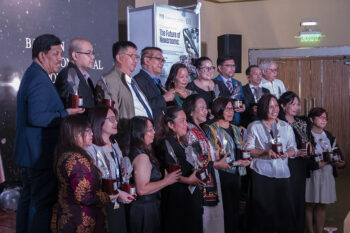MAKATI CITY (MindaNews/14 Sept) — Media reporting of the Mindanao peace process is pretty downbeat at the moment. At their meeting in Tokyo, President Aquino and MILF Chairman Murad agreed to fast track peace negotiations. But at the following round of talks in Kuala Lumpur those negotiations almost came off the rails. “Heaven and earth” is the term that has been used to contrast the positions of the two parties. It’s become the favourite soundbite from the KL meeting. But is the pessimism warranted?
Much attention has been focused on the issue of constitutional reform. And on this issue, the two parties are poles apart – no argument. The MILF are clear that charter change is a prerequisite for genuine self-governance in Muslim Mindanao. The GPH by contrast believes the same goal can be achieved within the framework of the 1987 Constitution. They’re not exactly saying “no constitutional reform – ever”, but their message seems clear enough for now: this isn’t a viable way forward amid current political realities.
This isn’t a small issue by any stretch. But let’s be clear that constitutional reform (if needed), is a means to an end, not the end itself. To make progress, it may be necessary to set sights more firmly on the ends – the desired goals or outcomes of the peace process – and then come back to the means of achieving them. And if we focus on the outcomes, perhaps the gulf between the two parties isn’t as wide as many commentators would suggest.
Part of the problem is that the MILF and GPH proposals are in very different forms: the MILF has tabled a detailed line-by-line agreement; the GPH has offered a broader conceptual framework. The difference of form risks obscuring possible convergences in the content. Fortunately, the summaries of their positions which both parties have published, plus press comments by members of the respective peace panels make some comparisons possible. At the risk of further complication, I’ll present the issues in a third way: “Past, Present & Future”. Let me explain.
First, the past. The MILF is clear that this process is about righting historical wrongs against the Moro people. The GPH has recognised the Moros’ legitimate grievances and the need to acknowledge their distinct identity, and suggested more intensive exploration of the historical issues as the third stage in a three-part peace process. Whether the MILF wants to take that approach remains to be seen – but certainly in Northern Ireland, the political agreements of 1998 and 2004 have made it possible to start to work through some painful historical issues, including those of the more recent past like the Bloody Sunday shootings of 1972.
Next, the present. The MILF calls the ARMM a bankrupt institution. They want it replaced, not reformed. The GPH is less explicit on this point, but has acknowledged that the ARMM in its current form has failed as a vehicle for empowerment. They have admitted to “multiple other possibilities for regional autonomy”. Whatever the future form of autonomy, they want to boost development and undertake other capacity-building within the existing ARMM, on the grounds that without this, any future form of self-governance will not prosper. The appointment of an OIC administration in the ARMM can be seen as providing a window of opportunity to do that. OK – that’s not the way the MILF would approach matters, but for their part they have spoken of some kind of “Interim Period” before full establishment of a new entity. In short, both are talking about a staged approach towards a new dispensation in Muslim Mindanao.
Which takes us to the future – or the shape of a new entity, to replace the ARMM. On this, there seem to me to be three big questions, namely territorial coverage, division of powers between Manila and the new entity, and resource sharing. (There’s also the not insignificant issue of what to call the new entity.) These are difficult issues, but both sides have presented positions on them, allowing for the start of a conversation. Let’s take them, briefly, in turn.
Territory. The MILF wants a bigger Bangsamoro region than the ARMM. Their position on this remains pretty much as set out in the MOA-AD. The GPH has suggested procedures for additional communities to join the region, for example through local government initiatives and plebiscite. Although they have not offered lists of places to be included, that opens the possibility of a region encompassing more of Muslim Mindanao than the ARMM. In that case, there’s a clear basis for a negotiation about exactly how much more, what the legal processes and safeguards would be to achieve this, and how to handle communities who do not want to be included.
Power-sharing. The MILF is not seeking independence (a point many commentators appear reluctant to accept). But they are seeking much more political power for the new entity. In the UK context, we call this devolution. We have “reserved powers” that remain with the Westminster government in London, and “devolved powers” (also called “transferred powers” in Northern Ireland), which represent the areas of legislative competence of the administrations in Scotland, Wales and Northern Ireland (which we call “devolved administrations”). The MILF for their part have made clear those powers which should be reserved to Manila; by definition, everything else devolves to the new administration in Muslim Mindanao. The GPH has come up with its own counter-proposal. Not surprisingly perhaps, the GPH list is longer than the MILF’s – but that very fact itself provides the basis for another negotiation. To aid that negotiation, and perhaps to avoid re-inventing wheels, there are many international models of devolution or regional autonomy already in place: not just Scotland or Wales, but Hong Kong and Macao in China, Catalonia in Spain, Flanders in Belgium, Aceh in Indonesia – among others.
And the picture is not dissimilar on the question of resource sharing between centre and region. Again, a more radical proposal from the MILF, a more cautious (or rather, less specific) one from the GPH. But once again, since the GPH has accepted the principle of wealth sharing, they are in a position to engage with the MILF on their more detailed proposals.
Now let’s be clear: none of these issues are straightforward. Contained within them are a host of very tricky sub-issues – like who’s responsible for security in a new entity, how the rights of minority groups will be protected or the role of Shariah law. Neither can the question of ends (including whether or not to reform the Constitution) be separated indefinitely from that of means. What seems plain to me, however, is that differences of political approach and language notwithstanding, there are sufficient points of convergence in what the two parties have proposed to make a successful negotiation a realistic proposition.
Perhaps it will take some new approaches in order to seal the deal – set-piece talks across a table are important, but they may not be sufficient in themselves to build the understanding and to close gaps. There may need to be many and more intensive private talks, in different formations and locations, to hammer out these different areas one by one – until there’s sufficient basis for a full agreement. As in any negotiation, there will have to be trade-offs and concessions, by both parties. In Tokyo, President Aquino and Chairman Murad emphasised the need for a problem-solving approach. For me, that’s what this is all about. (MindaViews is the opinion section of MindaNews. PeaceTalk is open to anyone who wants to share his/her views on peace in Mindanao. Stephen Lillie is the British Ambassador to the Philippines. This piece is from his blog, http://blogs.fco.gov.uk/roller/lillie/)







